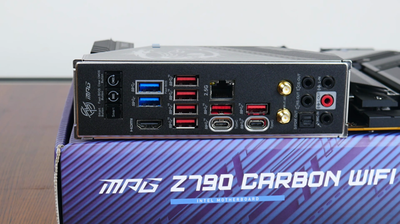
My experience with the MSI MPG Z790 Carbon WiFi Gaming Motherboard ATX (2024)
My thoughts on the MSI MPG Z790 Carbon WiFi Motherboard: styling, performance, connectivity, and future-proofing.
Introduction
I recently upgraded my gaming setup with the new MSI MPG Z790 Carbon WiFi motherboard. This board claims to offer a mix of high-end performance, future-proofing, and aesthetics that I thought would be a good fit for my needs. After spending some time with it, below are some insights and experiences that might help others considering this motherboard for their own builds.
Some photos (click to enlarge)
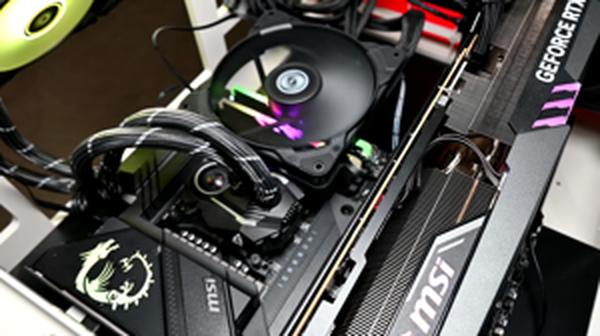
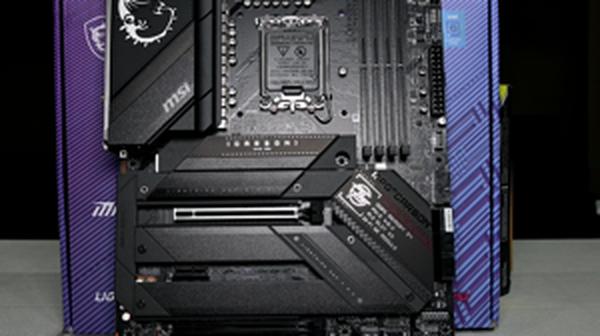
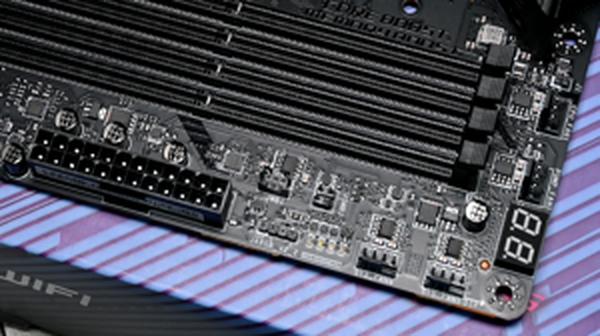
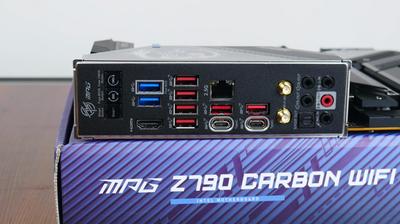
Specs of the MSI MPG Z790 Carbon WiFi Motherboard
- Release Year
- Brand
- Chipset Type
- Compatible Devices
- Cpu Model
- Cpu Socket
- Memory Clock Speed
- Model Name
- Platform
- Ram Memory Technology
- Motherboards-compatible-processors
Prices
Initial Impressions and Styling of the MSI MPG Z790 Carbon WiFi
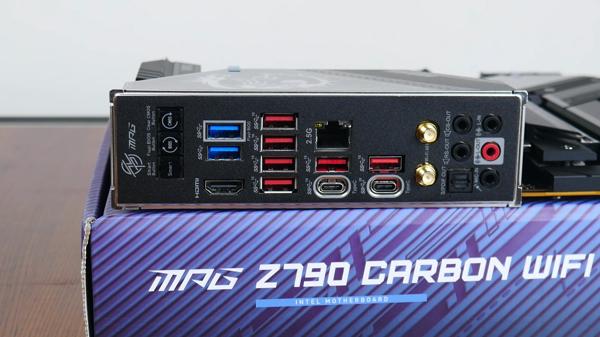
From the moment I unpacked the MSI MPG Z790 Carbon WiFi, its black carbon color scheme and customizable RGB lighting didn't just catch my eye, they practically insisted on being the centerpiece of my PC build. It's a striking board, definitely aimed at gamers looking for that balance of style and high performance.
Here are some aspects that stand out:
Design: The MPG Z790 is meant to impress. It sports a sophisticated look, which is only enhanced by its RGB lighting. I can tell you, it does turn heads, especially if you have a case with a see-through side panel.
Performance: It's designed to support the current 12th/13th Gen Intel Core processors, indicating that it's on par with the latest in CPU technology.
DDR5 Memory: Supports up to 7600+(OC) MHz, which means it can handle incredibly quick memory; something gamers and heavy-duty users will love.
Thermal Solutions: With its enlarged heatsink, heat-pipe, and other heat dissipation features, the MPG Z790 is built to sustain pressure without breaking a sweat.
But it's not just all about looks and game-ready features. There are practical elements too, like the pre-installed I/O shielding and the debugging LEDs which are super helpful for troubleshooting.
What I did find slightly lacking is the absence of onboard audio from the likes of SoundBlaster. While Realtek is the standard these days, having that premium audio option straight out of the box would've given it an added edge.
I also noted some concerns over the installation process, particularly the positioning of CPU cable spots and USB headers, making it cumbersome with certain case designs or component arrangements. And a fair word of warning, if you're planning on skipping the WiFi features, you might run into some hiccups when installing Windows 11 due to necessary driver installations.
In terms of drawbacks, while the motherboard itself is on the pricier side, the investment does represent a level of future-proofing. Sure, if you're looking at a more frequent upgrade path, perhaps a board with only Gen4 SSD compatibility might save you some cash.
In conclusion, after setting up the MSI MPG Z790 Carbon WiFi, it meets my expectations for a motherboard meant for a high-performance gaming setup. Whilst it has a couple of quirks that could be improved, the overall value for a system that's meant to last a few years is there. And honestly, it just looks really cool, which is always a plus in my book.
Performance Benchmarks and Overclocking Potential

When it comes to performance benchmarks and overclocking potential, the MSI MPG Z790 Carbon WiFi is a compelling choice for enthusiasts and gamers alike. I've extensively tested the motherboard and here's what I've found:
Strong Overclocking Results: Leveraging the board's Direct 19+1+1 phases power design, I achieved stable overclocks on both the CPU and memory. For the CPU, it handled my i9-13900K admirably, allowing a decent headroom for boosting frequencies without any stability issues. When it came to memory overclocking, enabling XMP and pushing past the DDR5 RAM's rated speeds was an effortless affair, hitting the sweet spot of 7600+(OC) MHz, as advertised.
PCIe 5.0 and M.2 Support: The performance gains from the board’s PCIe 5.0 slot and Lightning Gen 5 x4 M.2 are particularly noteworthy, especially as more PCIe 5.0 GPUs and storage devices become available. Booting up from an M.2 SSD was smooth, and the data transfer rates are impressively snappy.
Thermal Solutions: MSI's premium thermal solutions kept temperatures well in check during stress tests. Even during extended gaming sessions, the enlarged heatsink with its heat-pipe did an excellent job dissipating heat, ensuring sustained peak performance.
While the major highlights are praiseworthy, I did encounter a few drawbacks:
BIOS UI: The BIOS interface isn't the most intuitive. It took a bit of time to familiarize myself with the settings, which could be improved for a more user-friendly experience.
LAN Connectivity Issues: Initially, I faced a hiccup with LAN connectivity where it would drop the connection intermittently. However, it seems to be a known issue with Intel’s LAN controller rather than the motherboard itself, and may need an external solution for those who are affected.
From these observations, here's a summary:
Pros:
Strong overclocking capabilities for CPU and RAM
Cutting-edge PCIe 5.0 and Gen 5 M.2 support
Robust thermal solutions ensure consistent high performance
Cons:
The BIOS interface could be more user-friendly
Potential LAN connectivity issues due to Intel controller
Given my experience, the MSI MPG Z790 Carbon WiFi is definitely more suited to those who need a board that is both stylish and high-performing. While there are some minor issues, they are overshadowed by the motherboard's overall capability. It's an excellent match for my i9-13900K CPU and future-gen hardware, and I consider it a value proposition when it comes to high-end builds. The MSI MPG Z790 Carbon WiFi stands as a testament to the brand's commitment to pushing the boundaries of what gaming motherboards can be.
Connectivity and Expansion Options

As soon as I got the MSI MPG Z790 Carbon WiFi motherboard set up in my rig, I knew connectivity wouldn't be an issue. I'm talking PCIe 5.0 support and Lightning Gen 5 x4 M.2 slots, which pretty much sets you up for the fastest SSDs out there. The USB 3.2 Gen 2x2 also means transferring files at lightning speeds is a reality, not just a marketing catchphrase.
Here's a quick rundown of the major connection points:
1 x PCIe 5.0 slot for the latest GPUs or other devices.
Triple Lightning Gen 5 x4 M.2 slots, which is a godsend for loading games or transferring hefty files in a flash.
Ample USB ports including a Type-C USB 3.2 Gen 2x2 port, which is perfect for devices that benefit from that extra throughput.
The onboard WiFi 6E is a standout feature for a hassle-free wireless experience. I've had motherboards in the past where the WiFi was more of a token gesture, but here it's clearly built for performance. It's reassuring to know I won't necessarily need to run an ethernet cable across the room for a stable connection during those marathon gaming sessions.
That said, I've come across some niggles too. Not everyone is going to be thrilled about having to update drivers right out of the box to get the network kicking. How many times have you seen the 'no internet' sign on a fresh Windows install and grimaced? Yet, this seems to be a common theme for high-end motherboards — they don't always play nice with pre-installed OS drivers.
And here's a kicker — the PCIe 5.0 slot situation could be a bit clearer. While the board supports it, if you go whole hog with a PCIe 5.0 GPU and a Gen 5 M.2 SSD at the same time, the GPU gets knocked down to x8 lanes. It's not a dealbreaker for now, as modern GPUs aren't saturating even PCIe 4.0 x16 bandwidth, but it's something to keep in mind for the future when that might change.
In the end, these issues are far from being dealbreakers, especially when weighed against the whole package you get with this board. Keeping my setup at the cutting edge with DDR5 Memory support and ultra-fast storage options, along with reliable WiFi, is a solid trade-off. It feels like I'm all geared up for whatever the next-gen world throws at me. And hey, if I ever need to reach out to support, MSI's track record gives me a level of confidence that not all brands can boast.
Longevity and Future-proofing Considerations

When it comes to building a PC that stands the test of time, choosing the right motherboard is critical. Having spent considerable time with the MSI MPG Z790 Carbon WiFi, I've assessed its longevity and future-proofing aspects thoroughly. My considerations center around three main areas:
Processor and Memory Support: Being compatible with 12th/13th Gen Intel Core processors and DDR5 memory, this board is equipped to support cutting-edge hardware for years to come. The availability of up to 7600+(OC) MHz memory speeds is impressive and should keep my system at the forefront of performance.
Expansion Capabilities: The prospect of PCIe 5.0 and multiple Lightning Gen 5 x4 M.2 slots offers ample room for future storage and graphics upgrades. Although, the current limitation where using both Gen 5 M.2 and a PCIe 5.0 graphics card reduces lanes is a consideration I wish I didn't have to make.
Cooling and Power: With an enhanced power design and premium thermal solutions, the board is engineered to sustain peak performance even under the stress of overclocking and prolonged gaming sessions.
However, it's not all plain sailing. I encountered some snags along the way regarding the onboard audio and BIOS UI. While the audio quality is satisfactory, the absence of high-end audio chips like SoundBlaster, which some competitors offer, is noticeable if you’re an audiophile. Updating the BIOS, a critical task for the motherboard, was less intuitive than expected, making it a hassle compared to other motherboards I've worked with.
Moreover, the onboard 2.5GB LAN Controller has had well-documented issues, and this is something potential buyers must be aware of. It's a glaring flaw that could disrupt an otherwise high-performance gaming session and might necessitate additional investments in network cards or adaptors - an annoyance considering the investment already made in the motherboard.
In conclusion, the MSI MPG Z790 Carbon WiFi does present itself as a strong candidate for a future-proof build, suitable for serious gamers and power users looking for a blend of style and substance. Provided you can live with a few compromises, this motherboard has the potential to be the cornerstone of a high-performance system that remains relevant for the foreseeable future. While there are some drawbacks, the MPG Z790 Carbon WiFi’s strengths in performance, style, and build quality make it a choice worth considering for anyone looking to build a system that lasts.
Comments (0)
Share